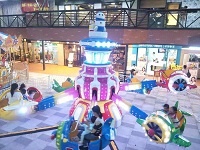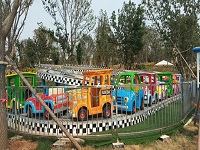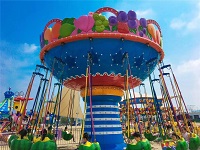What Is The Fatigue Strength Of Mechanical Parts Of Outdoor Amusement Park Equipment?
Under the condition of variable stress, the damage form of amusement equipment parts is fatigue fracture. Fatigue fracture has the following characteristics: the maximum stress of fatigue fracture is much lower than the strength limit of the material under static stress; regardless of brittle material or plastic material, the fatigue fracture of the material is a brittle sudden fracture without obvious plastic deformation; fatigue fracture is the accumulation of damage , its initial phenomenon is the formation of micro-cracks on the surface or surface of the part, and the micro-crack gradually expands with the increase of the number of stress cycles, until the remaining uncracked cross-sectional area is not enough to withstand the external load, the part suddenly breaks . This is clearly seen on the fracture of the part (see Figure 2-67). There are obviously two areas on the fracture: one is the smooth surface area formed by friction between the two sides of the crack under the repeated action of variable stress, and the other is the coarse-grained area where brittle fracture eventually occurs.



The main factors affecting the fatigue strength of mechanical parts of amusement equipment are:
1)Stress concentration: When a part is loaded, the local stress at the sudden change of its section geometry (such as fillets, holes, grooves, threads, etc.) is much greater than its nominal stress. This phenomenon is called stress concentration.
2)Geometry: When other conditions are the same, the larger the size of the part, the lower the fatigue strength. This is due to the fact that the larger the size, the coarser the grains of the material, the greater the probability of defects, and the relative thinning of the cold-work hardened layer on the surface after machining.
3)Surface condition: When other conditions are the same, the rougher the surface of the part, the lower the fatigue strength.



